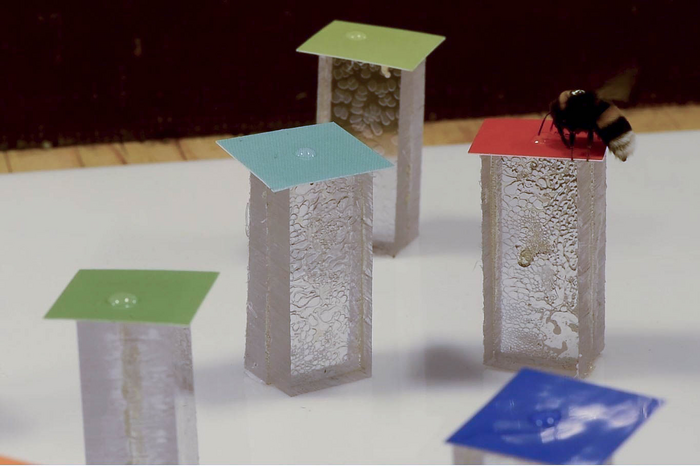Finnish researchers found out how Roundup, a herbicide containing glyphosate, affects the learning and memory of bumblebees. Already a small dose affected their ability to learn and memorise connections between colors and taste. The weakened fine color vision can severely impair bumblebees’ foraging and nesting success.

Credit: University of Turku
Finnish researchers found out how Roundup, a herbicide containing glyphosate, affects the learning and memory of bumblebees. Already a small dose affected their ability to learn and memorise connections between colors and taste. The weakened fine color vision can severely impair bumblebees’ foraging and nesting success.
In the study, bumblebees were exposed to an acute dose of herbicide that pollinating bumblebees might be exposed to in a sprayed field during the day. After the exposure, the bumblebees’ learning and memory were tested in a 10-color discrimination task, in which the bumblebees learned to associate five specific colors with a rewarding sugar solution and another five colours with an aversive quinine solution.
Control bumblebees learned to distinguish colors associated with sweet sugar water from colors associated with a bad-tasting compound and remembered what they learned after three days. Bumblebees exposed to the herbicide learned significantly less and forgot almost everything they had learned within a few days.
The researchers also found that the herbicide treatment did not affect bumblebees’ performance in an easier two-color discrimination task or a 10-odor discrimination task. The results suggest that while exposure to Roundup does not make bumblebees completely color or smell blind, it does impair their fine color vision.
“We focused on the cognitive traits of the bees because these traits determine the successful foraging and social behavior of social insects and therefore their fitness. I am really worried. Even one very small acute dose had a harmful effect on the bumblebees,” says researcher, Associate Professor Marjo Helander from the University of Turku, Finland.
“The result is even more worrying when you take into account how much glyphosate-containing herbicides are used globally,” states Helander.
“The results are quite worrying considering the importance of color vision for bumblebees. Even small disturbances in color vision can be catastrophic in terms of foraging and nesting success,” says Docent Olli Loukola from the University of Oulu, Finland.
Journal
Science of The Total Environment
DOI
10.1016/j.scitotenv.2022.159298.
Subject of Research
Animals
Article Title
Field-realistic acute exposure to glyphosate-based herbicide impairs fine-color discrimination in bumblebees
Article Publication Date
7-Oct-2022




